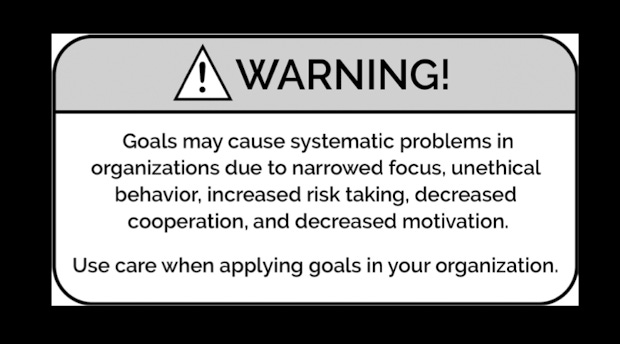OKRs: A word of warning
Objectives and Key Results (OKRs) may well be the most misunderstood bit of organisational technology ever invented.
They can be incredibly useful, when they are deployed in the right way - but they are very easy to get wrong. When you do get them wrong they become distorting and distracting, and end up taking a lot of energy to maintain with a low return on investment.
There are three things I'd like to say about OKRs which I think allow them to be used more usefully.
1. Goal Setting
OKRs are a tool for goal setting.
Goal setting is a powerful and worthwhile activity for organisations. If you don't define some kind of direction for the whole organisation to move in, then you may well find that everyone is pulling in slightly different directions.
You may not get to every goal you set - there are so many variables that might affect your progress - but if you don’t set any goals, you are relying entirely on luck which as any poker player will tell you is never a good idea.
You may even find that not reaching a defined goal is OK. It may only be by not getting to some specific point that you discover there is actually some other specific point that is more important to reach.
So I am in favour of goal setting - but, like measurement, it is not an "innocent" activity. It's not something that you can just do endlessly without consequence. There is a powerful magic underneath, which can leak out and come back to surprise the unwary traveller who happens across the shiny magic lamp.
For instance, focusing a fixed goal can leave you blinkered to better possibilities which emerge along the way. This is an example of inattentional blindness, the same cognitive distortion that's illustrated by the Invisible Gorilla experiment, where participants are so busy counting ball bounces, they don't notice the massive ape.
This and other risks of goal setting are actually laid out, right there, in the foundational text of OKRs, John Doerr's "Measure What Matters":
These risks don't mean we shouldn't set goals. They just mean we need good management every day to help hold those goals in the right way. By being in touch with the work that's going on and asking good questions, managers can continually coach people out of these pitfalls.
2. Changing Organisations
OKRs are not a tool for 'business as usual'. They are not intended for tracking things that are pretty reliably going to occur. They are about making change happen - and more than that they are about making organisation-wide change happen.
This is one reason why I would advocate strongly against "cascading" OKRs.
The objectives should be big strategic goals for the performance of the organisation as a whole. Goals which can only be achieved through cross-functional collaboration. We therefore want to keep the goals visible at the cross-function level to force people to have conversations about how to achieve them. When we break the organisation's objectives down into departmental objectives, we give each function permission to think locally. They can just focus on the achieving their team’s objectives, without regard to the impact on other functions, and even more importantly without regard for impact on the global goal.
Rather than thinking about company-wide objectives once a quarter, as part of a planning cycle, we want them to be in front of people all the time. They need to be popping up constantly and annoying people! Because change is annoying. We just want to get on with our jobs the same as we always have, and now we're having to think about change. Grr. (Yet another reason we need good relationships at work, to help us feel safe and secure and able to live with these frustrations.)
3. “As Measured By”
Key results are an agreed way of measuring an objective, which is not itself qualitative. We should be able to put the phrase "as measured by" between an objective and its key result(s).
Again let's quote an example from John Doerr:
This is why I say that organisations exist to create value, where value is what the customer cares about as measured by what they will pay for. Objectives can be grand, emotionally resonant goals. Objectives can also be things that have a binary truth condition - they’re false, false, false, false, and then suddenly true at the last minute. With grand sounding goals, we need a practical way to tell if we hit them or not. With binary goals, we need proxy some measure of progress towards them while they continue to be ‘false’. This is what Key Results are for.
The final words here go to Andy Grove, the inventor of OKRs:
The key result has to be measurable. But at the end you can look, and without any arguments: Did I do that or did I not do it? Yes? No? Simple. No judgments in it.



